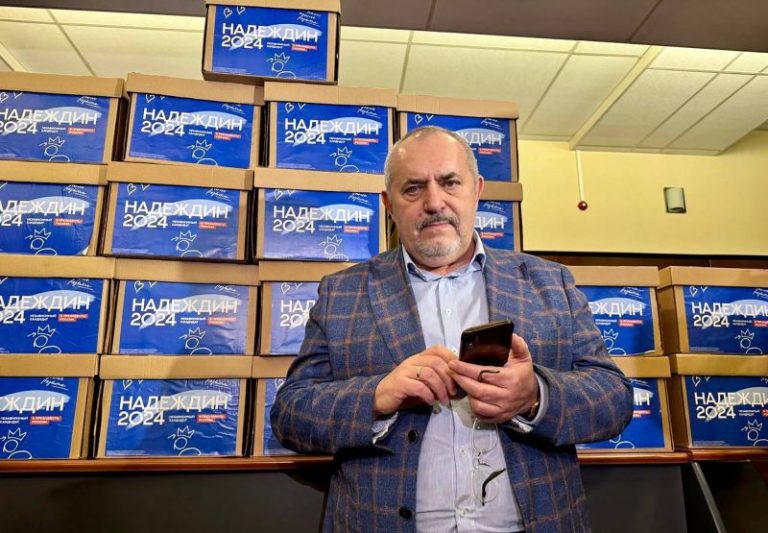Boris Nadezhdin, an anti-war candidate vying for the Russian presidency, said Wednesday he had submitted the signatures required to be listed on the presidential election ballot, potentially allowing him to stand against Vladimir Putin in March.
Nadezhdin announced he had delivered 105,000 signatures, the maximum allowed by law, to the Central Election Commission in Moscow, which now has 10 days to review the signatures.
“I want to say a huge thank you to those who believed in us. Many thanks to those dozens, even hundreds of thousands of people who stood in queues throughout our huge country, in 75 regions of the country, in more than 120 or 130 cities, collecting signatures,” Nadezhdin said at a press conference. He said he had collected 208,000 signatures in total.
“This is my pride, the many days of work of thousands of people without sleep,” Nadezhdin wrote on Telegram, alongside a picture of himself standing in front of a stack of cardboard boxes.
Thousands have lined up in cities across Russia and elsewhere in Europe since early January to give their signatures in support of Nadezhdin, with volunteers collecting expats’ signatures in cities from London and Paris to Georgia’s capital Tbilisi.
Putin announced late last year that he will seek a fifth presidential term, which could see him retain power until at least 2030. While Nadezhdin’s candidacy could represent little more than Putin’s need to fashion the appearance of democracy in Russia, his collection of the required signatures is a measure of the anti-war sentiment in the country as its full-scale invasion of Ukraine nears its second anniversary.
“This is the only candidate that wants to stop the military action on someone else’s territory,” said a voter called Anatoly as he waited in line to give his signature in a snow-swept Moscow.
Exacting standards
Nadezhdin, a 60-year-old former State Duma MP running as an independent from the Civic Initiative Party, has positioned himself as the only presidential candidate willing openly to oppose Russia’s war in Ukraine. His manifesto describes the invasion as a “fatal mistake.”
People have been arrested for far less in Russia. How has Nadezhdin’s campaign been able to get this far? The question confounds even the politician himself.
He has garnered the support of other prominent Russian opposition figures, including members of jailed Kremlin critic Alexey Navalny’s team and exiled oligarch Mikhail Khodorkovsky, who urged Russian citizens to add their signatures for Nadezhdin.
Although Nadezhdin has gathered the requisite number of signatures, his campaign will be challenged by the exacting and often arbitrary standards imposed by Russia’s CEC. To formally register as a candidate, the CEC stipulates no more than 2,500 votes can come from a single region. Previous candidacies have been refused on a technicality.
Yekaterina Duntsova, another independent candidate who openly decried the war in Ukraine, was in December rejected by the Central Election Commission, citing alleged errors in her campaign group’s registration documents. Duntsova later called on people to support Nadezhdin’s candidacy.
In January, shortly after expressing her intent to create her own political party, Duntsova reported being detained briefly by traffic police and randomly drug-tested. Opponents of the Kremlin have often alleged the fabrication of criminal charges through the planting of drugs.
Nadezhdin reported last week that a “denial of service” attack had briefly crashed his official website.
The Kremlin has expressed confidence that Putin has the overwhelming support of Russian citizens ahead of the election to be held on March 15-17 in which he is hoping to secure another six-year term.

